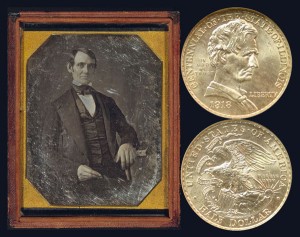Today, the Illinois Centennial Commemorative Silver Half Dollar Coin remembers a speech Abraham Lincoln gave 174 years ago.
An excerpt found in the book Lincoln Addresses and Letters published in 1914 and edited by Charles W. Moores:
=====
At a time and in a pioneer country where no especial odium attached to the use of intoxicants, Lincoln was a total abstainer and always remained so. The literary style of this early effort is florid and opaque. It betrays its author’s personality only where it shows Lincoln’s sympathy for the unfortunate, and, in one place, his irrepressible humor.
From An Address Before the Springfield Washingtonian Temperance Society, February 22, 1842:
Although the temperance cause has been in progress for near twenty years, it is apparent to all that it is just now being crowned with a degree of success hitherto unparalleled.
The list of its friends is daily swelled by the additions of fifties, of hundreds, and of thousands. The cause itself seems suddenly transformed from a cold abstract theory to a living, breathing, active, and powerful chieftain, going forth conquering and to conquer.
The citadels of his great adversary are daily being stormed and dismantled; his temple and his altars, where the rites of his idolatrous worship have long been performed, and where human sacrifices have long been wont to be made, are daily desecrated and deserted.
The triumph of the conqueror’s fame is sounding from hill to hill, from sea to sea, and from land to land, and calling millions to his standard at a blast.
…
Another error, as it seems to me, into which the old reformers fell, was the position that all habitual drunkards were utterly incorrigible, and therefore must be turned adrift and damned without remedy in order that the grace of temperance might abound, to the temperate then, and to all mankind some hundreds of years thereafter.
There is in this something so repugnant to humanity, so uncharitable, so cold-blooded and feelingless, that it never did, nor ever can enlist the enthusiasm of a popular cause.
We could not love the man who taught it — we could not hear him with patience. The heart could not throw open its portals to it, the generous man could not adopt it — it could not mix with his blood.
It looked so fiendishly selfish, so like throwing fathers and brothers overboard to lighten the boat for our security, that the noble-minded shrank from the manifest meanness of the thing.
And besides this, the benefits of a reformation to be effected by such a system were too remote, in point of time to warmly engage many in its behalf.
Few can be induced to labor exclusively for posterity; and none will do it enthusiastically.
Posterity has done nothing for us; and theorize on it as we may, practically we shall do very little for it, unless we are made to think we are at the same time doing something for ourselves.
What an ignorance of human nature does it exhibit, to ask or expect a whole community to rise up and labor for the temporal happiness of others, after themselves shall be consigned to the dust, a majority of which community take no pains whatever to secure their own eternal welfare at no more distant day!
Great distance in either time or space has wonderful power to lull and render quiescent the human mind.
Pleasures to be enjoyed, or pains to be endured, after we shall be dead and gone, are but little regarded even in our own cases, and much less in the cases of others.
Still, in addition to this there is something so ludicrous in promises of good or threats of evil a great way off as to render the whole subject with which they are connected easily turned into ridicule.
“Better lay down that spade you are stealing, Paddy; if you don’t you’ll pay for it at the day of judgment.”
“Be the powers, if ye’ll credit me so long I’ll take another jist.”
…
“But,” say some, “we are no drunkards, and we shall not acknowledge ourselves such by joining a reformed drunkard’s society, whatever our influence might be.”
Surely no Christian will adhere to this objection.
If they believe, as they profess, that Omnipotence condescended to take on himself the form of sinful man, and as such, to die an ignominious death for their sakes, surely they will not refuse submission to the infinitely lesser condescension for the temporal and perhaps eternal salvation of a large, erring, and unfortunate class of their fellow creatures.
Nor is the condescension very great.
In my judgment, such of us as have never fallen victims have been spared more by the absence of appetite, than from any mental or moral superiority over those who have.
Indeed I believe, if we take habitual drunkards as a class, their heads and their hearts will bear an advantageous comparison with those of any other class.
There seems ever to have been a proneness in the brilliant and warm-blooded to fall into this vice.
The demon of intemperance ever seems to have delighted in sucking the blood of genius and of generosity.
What one of us but can call to mind some relative more promising in youth than all his fellows, who has fallen a sacrifice to his rapacity?
He ever seems to have gone forth, like the Egyptian angel of death, commissioned to slay, if not the first, the fairest born of every family.
Shall he now be arrested in his desolating career?
In that arrest all can give aid that will; and who shall be excused that can and will not?
Far around as human breath has ever blown, he keeps our fathers, our brothers, our sons, and our friends prostrate in the chains of moral death. . . .
=====
The Illinois Centennial Commemorative Silver Half Dollar Coin shows beside the earliest known image of Abraham Lincoln, circa 1846-7.
